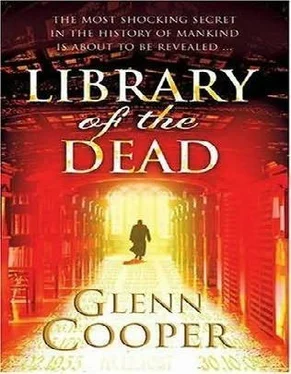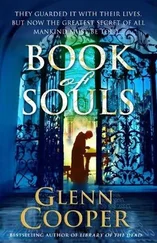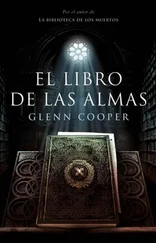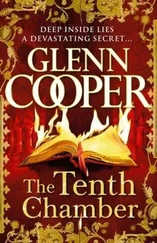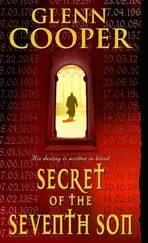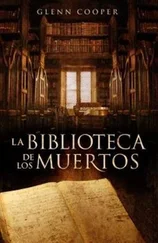Glenn Cooper - Library of the Dead
Здесь есть возможность читать онлайн «Glenn Cooper - Library of the Dead» весь текст электронной книги совершенно бесплатно (целиком полную версию без сокращений). В некоторых случаях можно слушать аудио, скачать через торрент в формате fb2 и присутствует краткое содержание. Жанр: Триллер, на английском языке. Описание произведения, (предисловие) а так же отзывы посетителей доступны на портале библиотеки ЛибКат.
- Название:Library of the Dead
- Автор:
- Жанр:
- Год:неизвестен
- ISBN:нет данных
- Рейтинг книги:3 / 5. Голосов: 1
-
Избранное:Добавить в избранное
- Отзывы:
-
Ваша оценка:
- 60
- 1
- 2
- 3
- 4
- 5
Library of the Dead: краткое содержание, описание и аннотация
Предлагаем к чтению аннотацию, описание, краткое содержание или предисловие (зависит от того, что написал сам автор книги «Library of the Dead»). Если вы не нашли необходимую информацию о книге — напишите в комментариях, мы постараемся отыскать её.
Library of the Dead — читать онлайн бесплатно полную книгу (весь текст) целиком
Ниже представлен текст книги, разбитый по страницам. Система сохранения места последней прочитанной страницы, позволяет с удобством читать онлайн бесплатно книгу «Library of the Dead», без необходимости каждый раз заново искать на чём Вы остановились. Поставьте закладку, и сможете в любой момент перейти на страницу, на которой закончили чтение.
Интервал:
Закладка:
Yet Paulinus was unwilling to offer an explanation. Instead he suggested a mission, and the two men schemed about how best to accomplish it. They agreed to keep their knowledge of the boy secret, for what good could possibly come in upsetting the community before Paulinus could divine the truth?
When Josephus had drained the last of his ale, Paulinus reached for the candle. Just before he blew it out he told Josephus something that had been on his mind.
"You know," he said, "there is nothing to say that in the case of twins, the seventh son to be born of a woman is, by necessity, the seventh son that God had conceived."
Ubertus rode through the countryside of Wessex on the mission that Prior Josephus had pressed on him. He felt an unlikely servant for the task but was beholden to Josephus and could not refuse him.
The heavy, sweating animal between his legs warmed his body against the crisp chill of the mid-December day. He was not a good rider. Stonecutters were used to slow speeds in an ox-drawn cart. He gripped the reins tightly, pressed his knees against the belly of the beast and held on as best he could. The horse was a healthy animal that the monastery kept stabled on the mainland, just for this kind of purpose. A ferryman had rowed Ubertus from the shingled beach of Vectis to the Wessex shore. Josephus had instructed him to make haste and return within two days, which meant the horse must be made to canter.
As the day wore on the sky turned slate gray, a hue akin to the rocky face of the coastal undercliffs. He rode at pace through a frosty countryside of fallow fields, low stone walls, and tiny villages, much like his own. Occasionally he passed dull-looking peasants, trudging on foot or riding lethargic mules. He was mindful of thieves but in truth his only possessions of value were the horse itself and the few small coins that Josephus had given him for the journey.
He arrived in Tisbury just before sundown. It was a prosperous town with several large timber houses and a multitude of neat cottages lining a broad street. On a central green, sheep huddled in the gloom. He rode past a small wooden church, a solitary structure on the edge of the green, which stood cold and dark. Beside it was a small burial ground with signs of a fresh grave. He quickly crossed himself. The air was filled with smoky hearth fires, and Ubertus was distracted from the burial mound by the delicious odors of charred meat and burning fat everywhere.
Today had been market day, and there were still carts and produce stalls in the square not yet removed because their owners remained in the tavern drinking and throwing dice. Ubertus dismounted at the tavern door. A boy took notice and offered to hold his reins. For one of his coins, the boy led the horse away for a bucket of oats and a trough of water.
Ubertus entered the warm crowded tavern and his senses were assaulted by a din of drunken voices and the smells of stale ale, sweating bodies, and piss. He stood before the blazing peat fire, revived his cramped hands and called out in his thick Italian accent for a jug of wine. Since it was a market town, the men of Tisbury were well-used to strangers, and they received him with cheerful curiosity. A group of men called him to their table and he fell into an animated conversation about where he hailed from and why he had come to town.
It took Ubertus under an hour to pour three jugs of wine down his throat and obtain the knowledge he had been sent to discover.
Sister Magdalena usually walked through the abbey grounds at a deliberate pace, not too slowly, as that would be wasteful of time, but not too speedily, as that would create the impression that something on this earth was more important than the contemplation of God.
Today she ran, clutching something in her hand.
A few days of warmer air had thinned the snow to a patchy shell, and the paths were well-trampled and no longer slippery.
In the Scriptorium, Josephus and Paulinus sat alone in silence. They had dismissed the copyists so they could meet privately with Ubertus, who had returned from his mission, cold and exhausted.
Ubertus was no longer there, having been sent back to his village with a grim thanks and a benediction.
His report was simple and sobering.
On the eighteenth day of December, three days earlier, a child was born in the town of Tisbury to Wuffa the tanner and his wife Eanfled.
The child's name was Sigbert.
While neither would openly admit it, they were not shocked by the news. They half expected to hear as much since it was scarcely possible that the fantastic circumstances of a mute boy born to a dead mother who could, without tuition, write names and dates, could grow more fantastic.
When Ubertus was gone, Paulinus had said to Josephus, "The boy was the seventh son, of this there can be no doubt. He has a profound power."
"Is it for good or evil?" Josephus asked shakily.
Paulinus looked at his friend, puckered his mouth but did not answer.
Without warning, Sister Magdalena burst in.
"Brother Otto told me you were here," she said, breathing heavily and slamming the door behind her.
Josephus and Paulinus exchanged conspiratorial glances. "Indeed we are, Sister," Josephus said. "Is there something troubling you?"
"This!" She thrust her hand forward. There was a rolled parchment in her fist. "One of the sisters found this in the children's dormitory under the pallet of Octavus's bed. He has stolen it from the Scriptorium, I have no doubt. Can you confirm it?"
Josephus unrolled the parchment and inspected it along with Paulinus.
Kal ba Lakna
21 12 782 Natus
Flavius de Napoli
21 12 782 Natus
CNMEOH
21 12 782 Natus
21 12 782 Mors
Juan de Madrid
21 12 782 Natus
Josephus looked up from the first page. It was written in Octavus's tight scrawl.
"That one is in Hebrew, I recognize the script," Paulinus whispered to him, pointing at one of the entries. "I do not know the origin of the one above it."
"Well?" the sister demanded. "Can you confirm the boy has stolen this?"
"Please sit, Sister." Josephus sighed.
"I do not wish to sit, Prior, I wish to know the truth and then I wish to severely punish this boy."
"I beg you to sit."
She reluctantly sat upon one of the copying benches.
"The parchment was certainly stolen," Josephus began.
"The wicked boy! But what is this text? It seems a strange listing."
"It contains names," Josephus said.
"In more than a single language," Paulinus added.
"What is its purpose and why is Oswyn included?" she asked suspiciously.
"Oswyn?" Josephus asked.
"The second page, the second page!" she said.
Josephus looked at the second sheet.
Oswyn of Vectis
21 12 782 Mors
The blood drained from Josephus's face. "My God!"
Paulinus rose and turned away to hide his expression of alarm.
"Which of the brothers wrote this?" Magdalena demanded to know.
"None of them, Sister," Josephus said.
"Then who wrote it?"
"The boy, Octavus."
Josephus lost count of the number of times Sister Magdalena crossed herself as he and Paulinus told her what they knew of Octavus and his miraculous ability. Finally, when they were done and there was no more to be told, the three of them exchanged nervous looks.
"Surely this is the work of the Devil," Magdalena said, breaking the quiet.
Paulinus said, "There is an alternative explanation."
"And that is?" she asked.
"The work of the Lord." Paulinus chose his words carefully. "Surely, there can be no doubt that the Lord chooses when to bring a child into this world and when to reclaim a soul to his bosom. God knows all. He knows when a simple man calls out to him in prayer, he knows when a sparrow falls from the sky. This boy, who is unlike all others in the manner of his birth and his countenance, how do we know he is not a vessel of the Lord to record the comings and goings of God's children?"
Читать дальшеИнтервал:
Закладка:
Похожие книги на «Library of the Dead»
Представляем Вашему вниманию похожие книги на «Library of the Dead» списком для выбора. Мы отобрали схожую по названию и смыслу литературу в надежде предоставить читателям больше вариантов отыскать новые, интересные, ещё непрочитанные произведения.
Обсуждение, отзывы о книге «Library of the Dead» и просто собственные мнения читателей. Оставьте ваши комментарии, напишите, что Вы думаете о произведении, его смысле или главных героях. Укажите что конкретно понравилось, а что нет, и почему Вы так считаете.
